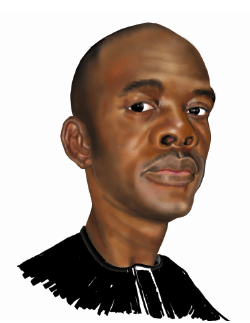By Ikechukwu Amaech

I jumped at the offer on Sunday night when Rotimi Amaechi, the Minister of Transportation, asked if I could join him on Monday, October 28, to inspect the Lagos-Ibadan corridor of the Lagos–Kano standard gauge railway project.
So much has been said about the revolution in the railway sector that I needed to see for myself what it was all about.
I love the rail.
Outside Nigeria, I have experienced efficient rail transport. And, as an icing on the cake, with the rails, you can see the countryside in a smooth ride.
The last time I had a train ride in Nigeria, from Umuahia to Kaduna, was well over three decades ago.
The journey was grueling for a starry-eyed secondary school lad, as we spent almost two days on dilapidated narrow-gauge tracks with a dismal speed of about 45 kilometres per hour.
That notwithstanding, I enjoyed every bit of the trip.
But I never had another ride in the locomotive until this Monday, not because I didn’t want to, but because the narrow-gauge system built by the colonialists in the early 1900s had fallen to pieces due to lack of maintenance.
The state of disrepair was such that passenger traffic fell from 11 million in 1964 to 1.6 million in 2003. It was worse for freight traffic which almost collapsed, falling from 3 million tonnes in 1964 to less than 100,000 tonnes in 2000.
The quest for economic growth makes a standard gauge line both desirable and imperative.
On hand for the inspection – which kicked off from the Ebute-Metta, Lagos office of the Nigeria Railway Corporation (NRC) – were NRC Chairman, Ibrahim Musa; Managing Director, Fidet Okhiria; Director, Rail Transport Services, M.T. Babakobi; and a battery of journalists, including BBC correspondents.
But the August guest, no doubt, was Amaechi’s wife, Judith, who insisted on accompanying her husband to see firsthand the gargantuan project and to understand why the minister spends so much time on the project site.
Defying the early morning rains, the inspection team and engineers from China Civil Engineering Construction Corporation (CCECC), the contractors handling the project, moved from Ebute-Metta to Oshodi to Iju.
The team inspected the overpass at Asade level crossing in Agege before boarding the train from Agbado that took us to Ibadan, inspecting awe-inspiring construction works at various stations along the 156-kilometre rail line which included Kajola, Papalanto, Abeokuta and Omi Adio.
There are eight mini stations and four standard stations in Apapa, Ebute-Metta, Abeokuta and Ibadan. Each major station will have hotels, shopping malls and other facilities that make travelling a delightful affair.

Unlike the narrow gauge, the 1,435 mm (4 ft 8 1⁄2 in) standard gauge with a speed of between 150 and 250 kilometres per hour, will make it possible for residents in Abeokuta, Ibadan and other places in Ogun and Oyo states to work in Lagos without hassle; as it is the case in other parts of the world.
One needs to go on this tour to appreciate the work done so far. The project is a full package.
Apart from the 12 stations, there are bridges, overpasses and underpasses. The bridge across Ogun River, one of the longest along the corridor, was a delight to see. Hills and mountains were cut into to get the level for laying tracks, giving the feeling, sometimes, of an underground tube.
Amaechi showed, in words and in action, that he was on top of the game. He is a hands-on minister who knows every detail of the project and wants to test-run the tracks by giving Nigerians free rides by the end of November.
At the Kajola mini station, where he had a meeting with the contractors, he was not very pleased with the speed of work and told them to complete at least one track up to Ebute-Metta by the end of November.
Excuses of unceasing rain did not faze him. He told the contractors that his job as manager was to create problems and theirs as subordinates was to device creative ways to solve problems.
And one of the problems, he said, was the ultimatum to deliver the work by November 30, if not wholly, at least good enough for a test-run and free rides. Completion of the eight minor stations is also part of this mandate.
He urged them to triple their output to make up for the rainy days.
“We hope to test-run and start free rides at the end of next month so people travelling along this route during the end of year holiday season can enjoy the trains,” Amaechi explained.
He has every reason to push as hard as he is doing.
Just as he does in any assignment, he takes this project personal and wants to deliver. He reminded the contractors they had missed their self-imposed July timeline.
Amaechi reprimanded the contractors. “You said before the dissolution of the cabinet that you were going to complete the stations in three months – May, June, and July. But we are here today in October and the station is not completed. You have refused to bring your materials in and we are not owing you one kobo, we have paid everything, so what is the problem?”
Besides the antics of the contractors who may deliberately want the project slowed down, Amaechi also knows that for a country in a permanent state of politicking, time is crucial. He does not want the project caught up in the crosshairs of politics.
So, he reiterated at the Kajola meeting that the construction of the minor stations as well as the laying of the rail tracks from Iju to Ebute-Metta must be completed by November 25.
“On November 30, we will commence test-run. The issue is that we want to start it from Ebute-Metta, but they are saying it is Iju that is ready. As far as Lagosians are concerned, Iju is in Ogun State, and that is why I am pushing them to get to Ebute-Metta.”
The minister is also pushing to have more train coaches on the tracks to convey passengers for Christmas.

Only two executive coaches are available now but he is optimistic that others will arrive from China before then. But even if they don’t arrive on time, he promised that operation would still commence with the two coaches.
Such is his passion and zeal for the project.
Rather than importing every material from China, Amaechi is insisting on a good dose of local content. He told the Chinese to source materials locally, unless it is impossible to do so. They agreed.
He has also pushed for the establishment of a railway factory in Kajola; first, to assemble, and later produce, coaches and locomotives.
Vice President, Yemi Osinbajo, is billed to lay the foundation by November.
“In signing the agreement between Nigeria and the Chinese company, we agreed with them that they should produce most of the materials they need locally and they said it would be a bit difficult for them.
“So, we reached an agreement that they should start assembling wagons,” Amaechi said in explaining the Kajola project.
“Five years after that, they should start producing wagons and assembling coaches and locomotives and ten years after that, they should start producing locomotives and coaches here.
“Their argument is that if they produce, we will buy from them, instead of buying from outside and I told them that we will enter into agreement to buy from them. That way, we will be able to pay naira and save the scarce dollars.”
We started the inspection at 8 a.m. and didn’t return from Ibadan until 9 p.m. It was hectic but an eye-opening adventure. So much work has been done.

On our return trip, I praised Amaechi for job well done. But he insisted all credit must go to President Muhammadu Buhari. He is only an instrument in the hands of the president.
I agree! President Buhari has demonstrated an uncommon passion for the rail projects. If the government carries the work through, it will leave a worthy legacy behind.
But Amaechi’s role cannot be understated. Though in his humility, he wouldn’t like to take any personal credit, I doubt if these astonishing feats, even with President Buhari’s support, could have been achieved without his never-say-die spirit.
I wrote here on July 31, three months before this rail tour, that Amaechi was the poster minister of Buhari’s first term, and “if there were things Buhari could point at as achievements in his first four years in office, they were definitely feats recorded under Amaechi’s watch.” How prescient!













